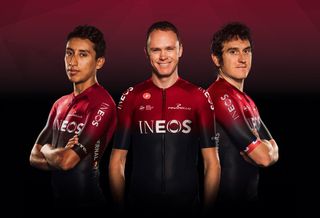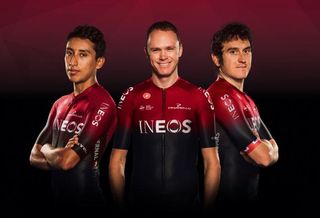Philippa York: Losing Chris Froome changes the Tour de France for every team
Brailsford has a number of important decisions to make

In May it was Egan Bernal and the Giro d’Italia, and now with the Tour de France on the horizon, Team Ineos find themselves in the same recurring bad dream, with Chris Froome out injured and the team’s Tour de France plans up in smoke. The quest to join the five-time winners is over – for now at least – and Dave Brailsford and his team have a number of difficult decisions to make.
York's Dauphine analysis: Pinot provokes and passes first test
Philippa York analysis: Bardet's Dauphine sits on knife's edge
Tom Dumoulin: Chris Froome's broken leg is bad for cycling
Richie Porte on Chris Froome: No one likes to see a rival hurt
Chris Froome undergoes successful eight-hour surgery after Dauphine crash
When you lose someone of Chris Froome's stature, things become more complicated for a team, even one of Team Ineos’ depths of talent and resources. Imagine a boat turning: it’s easy to turn a speedboat but those big tankers have momentum and weight and they’re much harder to alter course.
The structure at Team Ineos and how they go about racing Grand Tours has always been about concentrating on one leader, one plan, one objective. Last year with the victory of Geraint Thomas that strategy was upset but if the Welshman had faltered even slightly then there was always Chris Froome waiting to take over that leadership position.
Now with everything thrown up in the air, Brailsford and the other senior members of staff will have to find a replacement and also adjust the race tactics accordingly. When they had two riders in the GC battle, they had the luxury of playing both cards and that's something they can't count on if they decide to back Thomas in the same way they intended to do for Froome.
Of course, Egan Bernal could be called upon to fill the vacant place and it's a spot he is more than justified to take, but he may not yet have developed all the strengths needed to be on an equal footing with the defending champion, Geraint Thomas. Climbing-wise Bernal has no problems at all. His positioning in the bunch isn’t too shabby either, especially if he has someone Luke Rowe telling him where to go and when. The only weakness, and it's all relative at this level, is his time trial but remember there's a meagre 27km to cover alone in this year’s Tour. And it's not flat.
Thomas may not be as naturally talented as the Colombian when it comes to climbing but he covers all the other bases, and if he's in the same form as last year then he can climb with the best. His tactical awareness is also excellent, and he obviously has the experience Bernal lacks.
The question over leadership and the options the team face are subtle but not insubstantial.
Get The Leadout Newsletter
The latest race content, interviews, features, reviews and expert buying guides, direct to your inbox!
Do Ineos head to the Tour de France with one main leader in Thomas and also a special rider to back him up, like Bernal? But then Bernal may have more freedom to seize any chances and find himself de facto as the new leader, and they won't want to see anything resembling the Wiggins/Froome issue of 2012 so it’s not a simple decision to make. Not at all.
Then there's the other team riders to consider because the loss of a champion like Froome is going to affect their morale as well and duties as well.
Often when these types of incidents occur there's a temporary hole punched, not just in the composition of the team but also in the spirit of the remaining riders. They find themselves having to think about their own roles and when, like at the Giro d’Italia earlier this season for Bernal, they are asked to race differently at short notice.
As a rider that can make for a very difficult adaption. You’ve spent all winter, perhaps even longer, conditioning yourself as one type of rider with a specific goal and then all of a sudden the plan changes. You’re no longer the expert, doubt can creep in, and while you may see that as a new challenge and responsibility the small incremental shifts can have wide implications over three weeks.
Not everyone can go from riding in a domestique role to then be capable of following the violent accelerations that come with getting in breaks and still have the capabilities to win from that position.
You may have developed into the type of rider who has the position of controlling the peloton for a 100km each day or chasing down attacks on the early slopes of a mountain top finish. To go from that to suddenly finding yourself to coping with more explosive accelerations within a race can be jarring and it’s hard to recover when it's not what you have prepared for.
Ineos have the resources to answer many of the questions that the Froome’s injuries create but that doesn't mean to say they'll be decisions that are any easier to take. And the one commodity Brailsford and his team can’t alter is time. The clock will not stop ticking and with the Dauphine and the Tour de Suisse around the corner there are few opportunities to test new strategies.

What does losing Froome mean in a wider context?
The absence of the big pre-race favourite has happened before, with Merckx and Hinault for example, and it has had an effect on how the race is run.
When the team that everyone expects to control the race and set the tactics no longer needs to or wants to do that then there's a very different way of thinking for those riders that would otherwise have been satisfied with a place between fourth and tenth in Paris. Suddenly all the rival team managers realise that without that control they have a chance to step up another level. They have all endured Team Sky domination and were expecting the same again with Team Ineos this year, however when there isn't quite the same crushing blows to fear then there's a switch in mentality other teams know that this could be their chance to win.
With all due respect to Geraint Thomas, and he deserves that as the defending champion, rival teams will look at him and fancy their chances just a little better. Certainly more so than if a fit and healthy Froome had turned up.
With the news that Froome isn't going to be at the start in Brussels there'll be many directeur sportif looking again at their Tour team and maybe replacing one or two elements with the expectation that the race will be more open and could require a different type of rider to support the team leader.
Outfits like Groupama-FDJ, AG2R La Mondiale, and Movistar would have waited to see the damage inflicted upon them in the TTT and that first mountain top finish on La Planche des Belles Filles before being forced to decide how to use their resources.
I'm not saying that they'll definitely be any better off this time around but with one less rival to worry about they'll see other possibilities to consider. They might not have to fear being countered when they race aggressively and they’ll certainly know that an aggressive approach will not be matched by a Team Ineos as powerful as it could have been.
It could well be a very strange Tour de France. There'll only be two former winners present: Thomas and Nibali, so that experience and valuable knowledge won't necessarily be a major factor in how the first few battles among the GC contenders develop.
This year's Tour de France could well be a new game that everyone thinks they can play. And win.
Philippa York is a long-standing Cyclingnews contributor, providing expert racing analysis. As one of the early British racers to take the plunge and relocate to France with the famed ACBB club in the 1980's, she was the inspiration for a generation of racing cyclists – and cycling fans – from the UK.
The Glaswegian gained a contract with Peugeot in 1980, making her Tour de France debut in 1983 and taking a solo win in Bagnères-de-Luchon in the Pyrenees, the mountain range which would prove a happy hunting ground throughout her Tour career.
The following year's race would prove to be one of her finest seasons, becoming the first rider from the UK to win the polka dot jersey at the Tour, whilst also becoming Britain's highest-ever placed GC finisher with 4th spot.
She finished runner-up at the Vuelta a España in 1985 and 1986, to Pedro Delgado and Álvaro Pino respectively, and at the Giro d'Italia in 1987. Stage race victories include the Volta a Catalunya (1985), Tour of Britain (1989) and Critérium du Dauphiné Libéré (1990). York retired from professional cycling as reigning British champion following the collapse of Le Groupement in 1995.
